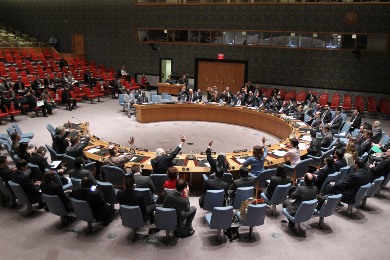Security Council adopts S. Sudan sanctions ahead of 5 March deadline
March 3, 2015 (WASHINGTON) – The United Nations Security Council (UNSC) has unanimously adopted a resolution creating a framework for a sanctions regime allowing to punish individuals spoiling efforts to end the South Sudanese conflict.

China which declared its opposition to sanctions several days ago, requested to add a paragraph welcoming China’s mediation between the rival parties.
The US drafted resolution demands the warring parties to fully observe the cessation of hostilities agreements, “including the progressive withdrawal of foreign forces deployed in South Sudan since 15 December 2013” and to commit themselves to finding a comprehensive agreement without further delay.
The text emphasises the purpose of the “targeted sanctions”, saying in aims to “support the search for peace” and set out a series of criteria to punish individuals or entities (government or rebel groups) directly or indirectly responsible for actions or policies threatening the peace, security or stability of the new nation.
The sanctions will be imposed on those expanding or extending the conflict or obstructing reconciliation and peace talks or processes, threatening transitional agreements or undermining the political process and planning, directing or committing acts that violate applicable international humanitarian and human rights law and human rights abuses.
The resolution also applies to those targeting civilians or attacking hospitals, religious sites, schools or locations where civilians seek refuge, or recruiting or using children by armed forces or groups.
Are punishable in accordance to the sanction framework, those who obstruct the work of international peacekeeping, diplomatic or humanitarian missions or hinder the delivery and distribution of humanitarian aid or access to such aid.
It also applies to those attacking the UN missions, other peacekeeping/international security presences, or humanitarian personnel, or acting directly or indirectly for or on behalf of individuals or entities listed by the sanctions committee.
Furthermore, the UNSC decided that it could impose a travel ban and an assets freeze for an initial period of one year on individuals and entities designated by a sanctions committee to be established through the resolution. The travel ban would apply to individuals, while the assets freeze would apply to individuals as well as entities such as government, opposition or militia groups.
To assist the sanctions committee in its work, the UNSC requested the secretary-general set up a five-member panel of experts to provide information relevant to the potential designation of individuals and entities.
The panel, among others will collect and analyse information regarding the flow of arms and related military assistance to those undermining the peace process and committing violations of international humanitarian and human rights law.
CALLS TO REFRAIN FROM SANCTIONS
South Sudan’s envoy to the United Nations, Francis Deng, regretted that the adoption of the “counter-productive” regime sanctions and called to refrain from imposing sanctions.
Deng said sanctions will not help to achieve peace but “they only tend to harden positions towards confrontation rather than cooperation”.
“We believe that the international community can play a positive role by engaging both parties constructively to expedite concluding an agreement,” he said.
Deng hailed the decision of the African Union to postpone the publication of the Investigation Committee because it may impact negatively on the peace process.
“In any case, now that the Security Council has adopted the sanctions resolution, we hope that it will refrain from actually imposing sanctions and engage the parties in a constructive dialogue to bring a speedy end to the conflict,” he said.
(ST)
